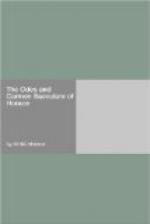of wine-jars and Thracian convivialities, of parsley
wreaths and Syrian nard; the graver topics, which
it is the poet’s wisdom to forget, are constantly
typified by the terrors of quivered Medes and painted
Gelonians; there is the perpetual antithesis between
youth and age, there is the ever-recurring image of
green and withered trees, and it is only the attractiveness
of the Latin, half real, half perhaps arising from
association and the romance of a language not one’s
own, that makes us feel this “lyrical commonplace”
more supportable than common-place is usually found
to be. It is this, indeed, which constitutes
the grand difficulty of the translator, who may well
despair when he undertakes to reproduce beauties depending
on expression by a process in which expression is
sure to be sacrificed. But it would, I think,
be a mistake to attempt to get rid of this monotony
by calling in the aid of that variety of images and
forms of language which modern poetry presents.
Here, as in the case of metres, it seems to me that
to exceed the bounds of what may be called classical
parsimony would be to abandon the one chance, faint
as it may be, of producing on the reader’s mind
something like the impression produced by Horace.
I do not say that I have always been as abstinent
as I think a translator ought to be; here, as in all
matters connected with this most difficult work, weakness
may claim a licence of which strength would disdain
to avail itself; I only say that I have not surrendered
myself to the temptation habitually and without a
struggle. As a general rule, while not unfrequently
compelled to vary the precise image Horace has chosen,
I have substituted one which he has used elsewhere;
where he has talked of triumphs, meaning no more than
victories, I have talked of bays; where he gives the
picture of the luxuriant harvests of Sardinia, I have
spoken of the wheat on the threshing-floors. On
the whole I have tried, so far as my powers would
allow me, to give my translation something of the
colour of our eighteenth-century poetry, believing
the poetry of that time to be the nearest analogue
of the poetry of Augustus’ court that England
has produced, and feeling quite sure that a writer
will bear traces enough of the language and manner
of his own time to redeem him from the charge of having
forgotten what is after all his native tongue.
As one instance out of many, I may mention the use
of compound epithets as a temptation to which the translator
of Horace is sure to be exposed, and which, in my
judgment, he ought in general to resist. Their
power of condensation naturally recommends them to
a writer who has to deal with inconvenient clauses,
threatening to swallow up the greater part of a line;
but there is no doubt that in the Augustan poets,
as compared with the poets of the republic, they are
chiefly conspicuous for their absence, and it is equally
certain, I think, that a translator of an Augustan
poet ought not to suffer them to be a prominent feature




